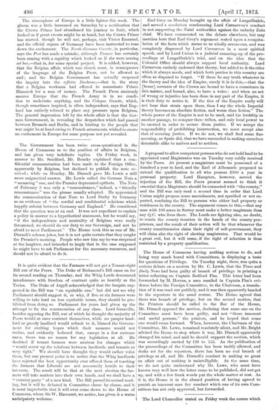The Government has been twice cross-questioned in the House of
Commons as to the position of affairs in Belgium, and has given very indefinite replies. On Friday week, in answer to Mr. Sandford, Mr. Bourke explained that a con- fidential communication had been made to the Foreign Office, apparently by Belgium, but declined to publish the note re- ceived; while on Monday, Mr. Disraeli gave Mr. Lewis a still more enigmatical answer. Mr. Lewis called the German Note a " menacing " one, and the Premier deprecated epithets. The Note of February 3 was only a "remonstrance," indeed, a "friendly remonstrance" was the phrase usually adopted. He appreciated the communication of that Note to Lord Derby by Germany as an evidence of "the cordial and confidential relations which happily subsist between Germany and England." He considered that the question was at an end. It was not expedient to explain a policy in answer to a hypothetical statement, but he would say, "if the independence and neutrality of Belgium were really threatened, we should do our duty to our Sovereign, and not be afraid to meet Parliament." The House took this as one of Mr.
Disraeli's solemn jokes, but it is not quite certain that they caught the Premier's meaning. People who saw him say he was surprised at the laughter, and intended to imply that in the case supposed he might have to ask Parliament for the necessary resources, and should not be afraid to do it.


































 Previous page
Previous page